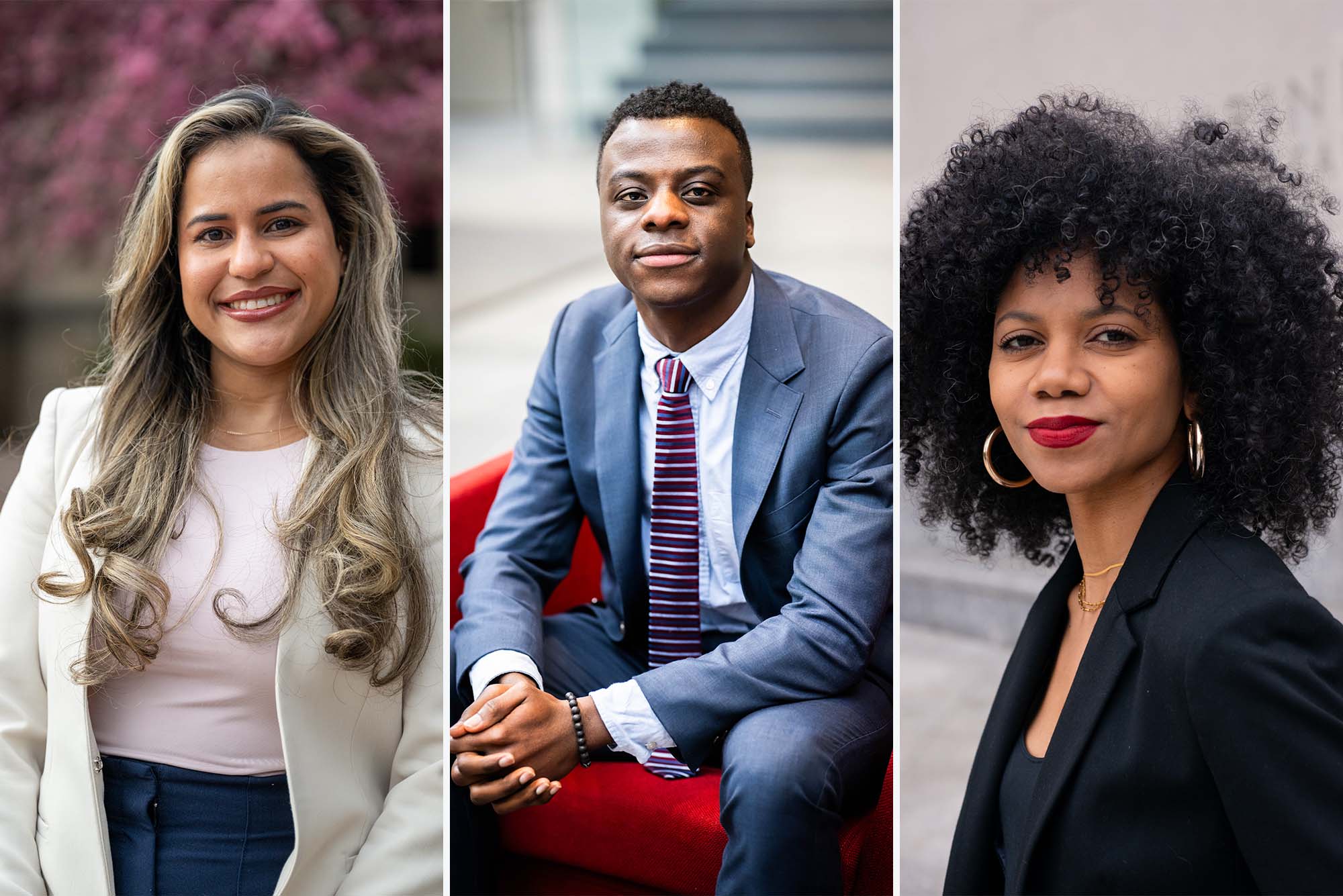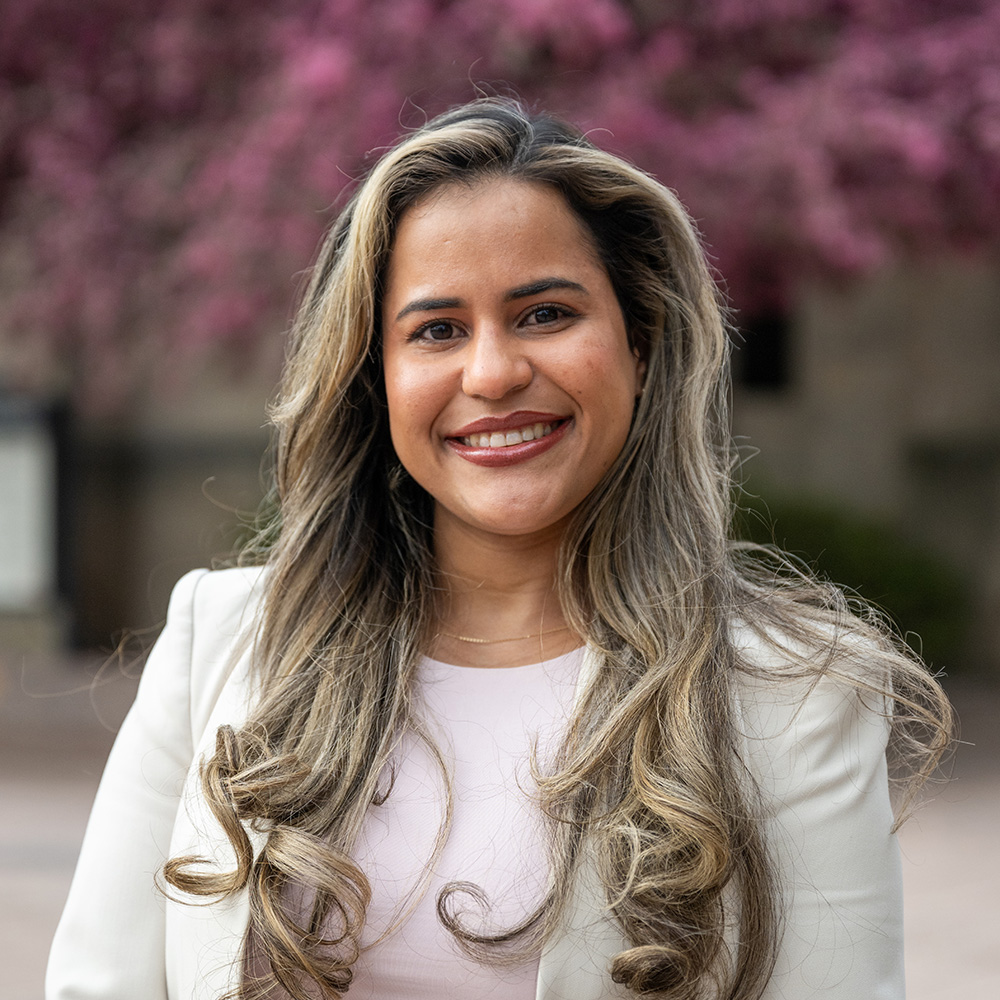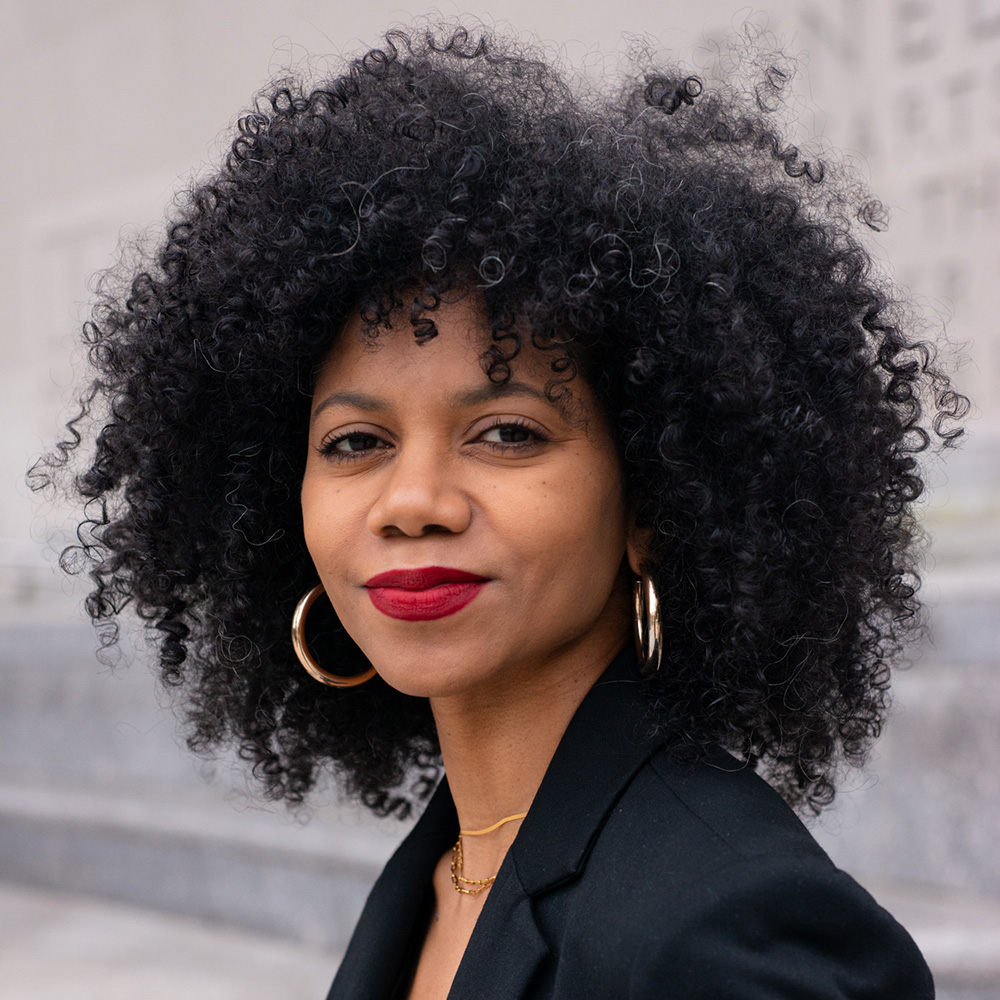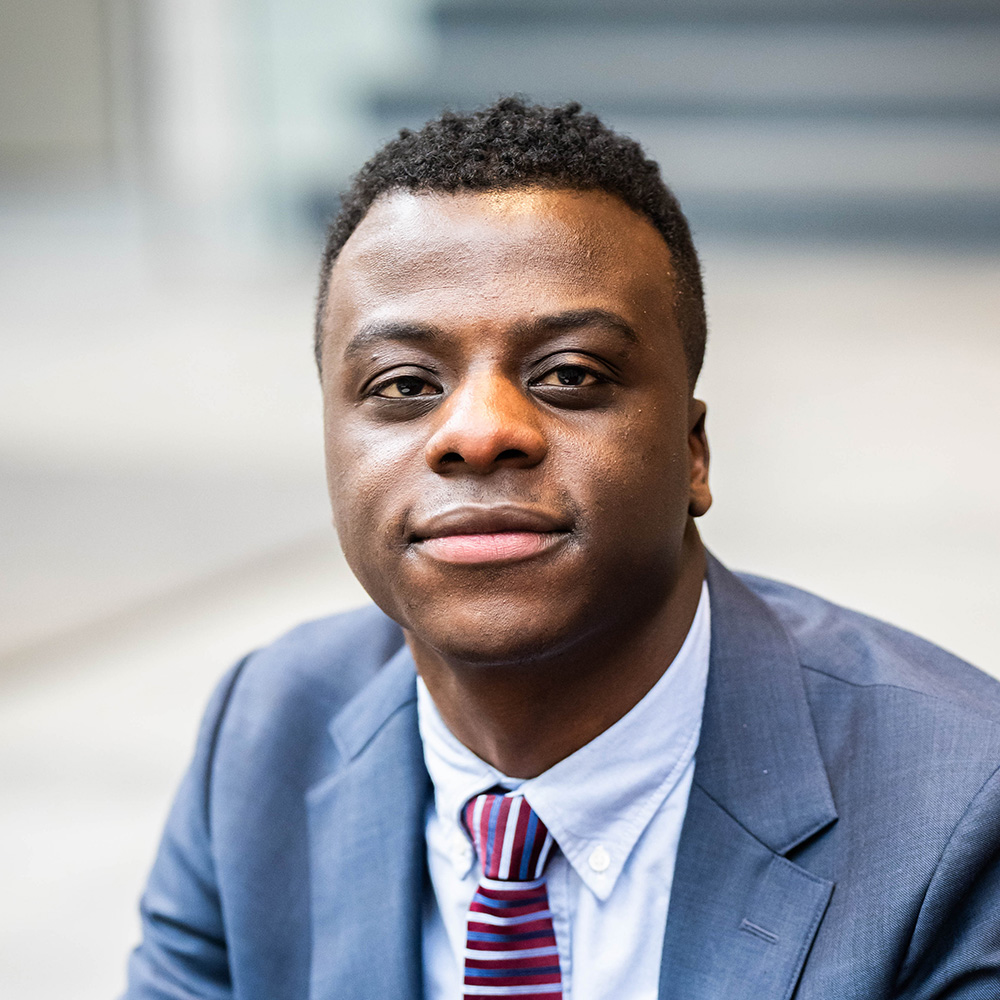Three Inspiring BU Master’s and Professional Graduates Who Plan to Give Back to Their Communities
All first-gen students, they hail from Wheelock, Metropolitan College, and the School of Law

Ana Calderon (MET’24) (from left), George Boateng (LAW’24), and Tabitha St. Bernard-Jacobs (Wheelock’24). Photos by Cydney Scott (Calderon), Jackie Ricciardi (Boateng), and Lauren Crothers (St. Bernard-Jacobs)
Three Inspiring BU Master’s and Professional Graduates Who Plan to Give Back to Their Communities
All first-gen students, they hail from Wheelock, Metropolitan College, and the School of Law
This year, Boston University is graduating almost 4,000 advanced-degree students.
These master’s, professional, and doctoral students have dedicated years to their studies, often while balancing jobs and families. Making it to Nickerson Field on Sunday, May 19, marks the culmination of the hard work and sacrifices they’ve made in pursuit of a second or even a third degree.
Each year, BU Today highlights three inspiring advanced-degree graduates. These three, from the Class of 2024, are immigrants and first-generation college students who found homes for themselves at BU. Hailing from Metropolitan College, the School of Law, and Wheelock College of Education & Human Development, all three say they plan to use their degrees to give back to their communities.
Ana Calderon (MET’24)

Ana Calderon’s secret to balancing a master’s program with a full-time job at Boston City Hall?
Lists, and lots of them.
“Every week, write down everything you need to do for school, everything you need to do for work, and everything you need to do for your own life,” says Calderon (MET’24), who’s graduating with a master’s in urban affairs from Metropolitan College. “Then try to find the space every day to do three to four of those things. That’s what I would do. That’s how you get along.”
Organization was critical to Calderon’s tenure at BU. She participated in MET’s City of Boston Employees Scholarship program, which allows Boston city employees to earn a MET graduate degree for free, as long as the degree is related to their field of work. Outside of BU, Calderon is chief of staff for Boston City Councilor At-Large Henry Santana.
That’s not exactly a recipe for free time. Nor did a busy job with after-hours obligations like attending community meetings afford her as much time for schoolwork as other students have. But she made it work.
Calderon came to Boston from the Dominican Republic as a teenager. Back home, her family had always stressed the importance of community engagement and voting in elections. So it was natural for her to become involved in like-minded nonprofits as a new South Boston resident. In high school, Calderon started working as a youth community organizer with the Roxbury nonprofit Sociedad Latina. And as a first-generation college student at UMass Boston, she worked with a similar civic engagement nonprofit, South Boston en Accíon.
That would serve as her introduction to local government.
“I was very involved with getting out the vote with Latino residents and making them aware of the importance of participating in elections and having their voice be heard,” Calderon says. “I met so many people in that [en Accíon] role—people in the community, state representatives, senators, city councilors.”
One of those people was Ed Flynn, a Boston city councilor.
Flynn hired Calderon to work as his director of constituent services, first part-time and then full-time when she graduated from UMass. That role is where Calderon honed her ability to make things work. (She left that job to work for Santana in February of this year.)
“When I was doing constituent services, what I enjoyed the most was telling people, ‘I have a solution to your issue,’” Calderon says. “There was so much I could do to get people from zero to 10—you’re in a shelter and you want stable housing? Let’s go apply to housing. You want to take ESL classes? Let’s find some. You want to build a career? Let’s get you into community college, then UMass Boston. You have all these connections to help residents, and I just loved that.”
Amidst the hustle, Calderon’s mind kept returning to one thing: grad school. Then COVID-19 and lockdowns happened, and during that time she also lost her twin brother.
“I thought, wow, life is short,” Calderon recalls. “After my brother’s passing and seeing everyone go through so much during the pandemic, I told myself I needed to do what I’d been wanting to do for so long.”
She applied for the City Scholars program after lockdowns ended. She chose Urban Affairs, a subset of MET’s City Planning & Urban Affairs Program. Urban Affairs looks at a broad range of issues that cities face—such as budgeting, housing, and traffic—and analyzes different solutions. It was extremely complementary with her work in City Hall, she says, which is why she enrolled.
“I love what I do,” Calderon says. “That’s why I wanted to go to school—to expand my knowledge on topics I’ve already worked on, and learn about what other cities do for things I haven’t worked on.”
Finding time for her school responsibilities required rigorous time management (and lots of support from her family and supervisors, she says). She set aside an hour before bed every night to do readings, and often used her lunch hours and T commutes to catch up. Her weekends were all about homework and writing papers. The one time she fell way behind on a major project, Calderon says, she took days off from work to get it done.
Her dedication resulted in being selected as the student speaker for MET’s 13th annual City of Boston Scholars reception on April 11.
Addressing the crowd of soon-to-be MET grads and their supervisors—including Boston Mayor Michelle Wu—Calderon told the group that her teenage self never could have imagined getting a graduate degree, never mind one from Boston University. Her new urban affairs master’s, she said, would allow her to make even more meaningful contributions to the city of Boston and beyond.
She ended by urging any City of Boston employee considering applying for the MET program to just go for it: “It’s amazing what you can accomplish with a little bit of support and discipline.”
Tabitha St. Bernard-Jacobs (Wheelock’24)

Tabitha St. Bernard-Jacobs (Wheelock’24) has had numerous labels over the course of her life: fashion designer, author, activist, consultant, wife, mother, immigrant, and stutterer. Her latest? Wheelock graduate.
St. Bernard-Jacobs is one of the first graduating cohort for Wheelock’s new online Master of Education (EdM) for Equity and Social Justice. The program, which fully launched in fall 2023, gives participants an overview of how systemic inequities develop before diving into strategies for ameliorating them through education.
The EdM is geared toward professionals working in education, social work, nonprofit, and government spaces. St. Bernard-Jacobs, a 2023 Martin Luther King. Jr. Fellowship winner, works as a columnist and runs an antiracist parenting consultancy with her partner. The two travel the country running trainings and workshops for institutions like businesses, school systems, and libraries. The EdM mirrors much of what she’s spent the past few years doing—but that’s exactly why she applied.
“I wanted to deepen my own lens on the work,” St. Bernard-Jacobs explains. “I wanted to deepen my own learnings and understandings around the intersection of early childhood and social justice. And I wanted to actually study antiracist parenting in order to have research grounding the work I was already doing—for example, having research around the fact that kids start forming friendships around race from as early as pre-K.”
Her journey to Wheelock and antiracism work involves many pivots.
St. Bernard-Jacobs grew up in Trinidad and Tobago. She escaped an abusive home and came to New York City at 19 on a scholarship to St. Francis College in Brooklyn. She studied psychology and went on to work with people with disabilities. Then she had what she calls her “quarter life crisis” and enrolled at the Fashion Institute of Technology to pursue her dream of becoming a fashion designer. She worked at a corporate brand before becoming disillusioned with the industry’s wastefulness and starting her own sustainable fashion line.
Then Donald Trump was elected president.
St. Bernard-Jacobs saw a colleague’s post about marching to Washington, D.C., in protest. When she noticed mostly white women mobilizing around a march, she reached out to the colleague about centering people of color in leadership roles within feminist movements. That’s how she ended up as an organizer of the historic 2017 Women’s March on Washington and a deputy executive director of the Women’s March organization in the following years.
Then she and her partner had their first child, a Jewish Afro-Indian son who presented as white. “I wrote a piece about the experience of being a Black mother with a child who had more safety than me in this country, and that began my writing career,” St. Bernard-Jacobs says.
St. Bernard’s writings on activism and antiracist parenting have appeared in Good Housekeeping, Apartment Therapy, on Romper.com, and more. Most recently, one of her essays was included in the anthology A Year of Black Joy: 52 Black Voices Share Their Life Passions (Magic Cat, 2023).
She and her partner launched their consulting business in 2020. Her time at Wheelock has only solidified her commitment to antiracist education, she says.
“I’m often the most radical person in many rooms I’m in, and that’s not the case at BU at all,” St. Bernard-Jacobs says. “I’m constantly in rooms with people who are challenging me in terms of my beliefs and helping me grow and helping me develop my lens on race and white supremacy, and so forth. I’ve learned an incredible amount.
“Seeing different approaches to education that have roots in restorative justice—these things really make me hopeful for the work that I’ll be able to do as I go into the world with the backing of a degree from BU.”
Eventually, she hopes to enter a doctoral program for equitable education. But that’s down the line, she says—for now, she’ll continue working with institutions to infuse antiracism into their structures, and on her own antiracist parenting. (She and her partner now have a second child, a girl.)
In everything she’s done, St. Bernard-Jacobs says—disability services, fashion, organizing, consulting, grad school—the through line has always been a desire to give back.
“I believe in the power of my ancestors guiding me through this world, and I see myself as being led to where I can have the highest intervention to help people,” she says. “The constant thread has always been a desire to be of service.”
George Boateng (LAW’24)

George Boateng (LAW’24) vividly remembers his first day of law school at Boston University.
The Ghana native and longtime Bronx resident says he was “so nervous. Everyone gets that doubt, right—the one of, do I belong here?”
It was September 2021. COVID-19 protocols were in full effect on campus. Students had to show their green symptom-attestation passes to access buildings. Boateng, a 2021 Martin Luther King Jr. Fellowship winner, arrived at the BU School of Law for his first day of classes—and realized he forgot his phone at home.
Nervous, he approached Geraldine Muir, associate dean for academic engagement at LAW, for help. After Boateng more or less word-vomited his situation at her, Muir immediately hopped on her phone and got him access to the building without a problem.
“That was one of the first acts of kindness I experienced at BU,” Boateng says. “I just felt like, okay, there are people who are human here and who will help me navigate this.”
That incident would go on to inform his time at BU Law.
From then on out, he says, Muir would always say hi when she saw him in the hallway. He ultimately got to know her better while serving as copresident of the Black Law Students Association (BLSA). They’d go out for lunch occasionally and have “great conversations,” Boateng says. “All that stemmed from that singular encounter.
It inspired Boateng to become a welcoming force of his own. From taking a leadership role in BLSA to joining LAW’s First Generation Professionals organization, mentoring new students, connecting with LAW alumni, sharing meals with students outside of his sections, and more, building community within the school was a priority from day one. His efforts also led to academic opportunities: he was recently named a recipient of the Emanuel Hewlett 1877 Award Fund, an award named for BU LAW’s first Black graduate that covers the cost of books and more for students most active in BLSA.
Winning the Hewlett prize “made me go, wow, I am making a difference here,” Boateng says. “I do belong here and I can foster and create community, and these relationships will continue after our three years are over.”
But Boateng didn’t always see himself going to law school.
He moved to the Bronx from Ghana when he was 11. His academic journey led him to Boston College, where he had a double major in history and sociology and a minor in African studies. He planned to become a college professor, but when it came time to graduate, professorhood didn’t quite feel right. He’d been heavily involved at BC, serving as president of the Black Student Forum and working as a program coordinator and academic advisor. Boateng started to think, how do I use all of these experiences?
That’s how he found himself in Palestine’s West Bank working as the English tutoring coordinator for a Catholic university.
That role was “a very interesting learning experience, but also a difficult one,” he says. He had to navigate cultural differences, a fraught political arena, and his privilege as an American with different rights than his Palestinian students. That was on top of actually doing his job, which saw him pair more than 200 students with volunteer tutors throughout Jerusalem and the West Bank. He stayed in that role for a year before returning home to the Bronx.
Then COVID-19 hit, and Boateng again saw himself face-to-face with inequity.
The pandemic exposed wide discrepancies between communities. Many Bronx residents took financial hits and struggled to find money for food. Others struggled to get their school-age children online for mandatory remote classes. Boateng started working as a political canvasser, distributing masks and hand sanitizer while educating residents about voting in the upcoming congressional election. He also helped organize food drives and get things like Wi-Fi and tablets for families.
Through that, he started thinking about what his next step might be. Law school kept coming to mind.
“I came to understand how the legal components and the economic components come together to impact both the emotional and sociological lived experiences of people,” Boateng says. “Law school would enable me to be an active agent in constructing the world I wanted to see.”
He was accepted to the School of Law and opted for the transactional practice concentration, which covers business agreements, intellectual property, and more. People were surprised he hadn’t opted for the courtroom route, he says. But to him, transactional law fulfills the same mission that litigation can—equity for those who need it.
“The economic component can help bring dreams into fruition,” he says, citing his course material on topics like contracts, legal risk, and corporate finance. Entrepreneurs from underrepresented backgrounds, he says, “need people like me to be in these rooms to gain all the knowledge I can.”
He’s still in the market for a job postgraduation. But he’s proud of what he’s accomplished in his three years at LAW.
“Right now, I don’t know how success at BU will translate directly into a job,” Boateng says. “But that success can lead you to opening doors for other people, for Black and Brown people who might think that being here and succeeding is an impossibility.
“I took that really, really seriously in helping foster that community at LAW, and making sure I did my part to make the door in this legal space wide open.”
Find more information about Commencement here.
Comments & Discussion
Boston University moderates comments to facilitate an informed, substantive, civil conversation. Abusive, profane, self-promotional, misleading, incoherent or off-topic comments will be rejected. Moderators are staffed during regular business hours (EST) and can only accept comments written in English. Statistics or facts must include a citation or a link to the citation.